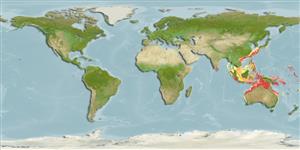Common names from other countries
Ikan bertulang rawan (sharks and rays) >
Carcharhiniformes (Ground sharks) >
Hemigaleidae (Weasel sharks)
Etymology: Hemigaleus: hemi-, from hemisys (Gr.), half, referring to similarity to and/or close affinity with Galeus (now in Pentanchidae). (See ETYFish); australiensis: -ensis, Latin suffix denoting place: referring to its occurrence off tropical Australia. (See ETYFish).
More on authors: White, Last & Compagno.
Environment: milieu / climate zone / depth range / distribution range
Ekologi
laut dasar (demersal); kisaran kedalaman 12 - 170 m (Ref. 56150). Tropical
Eastern Indian Ocean to Western Pacific: Australia and where records from Papua New Guinea need to be confirmed.
Length at first maturity / Size / Weight / umur
Maturity: Lm 62.5, range 60 - 65 cm
Max length : 110 cm TL jantan/; (Ref. 56150)
deskripsi pendek
Morfologi | Morfometrik
Diagnosis: Medium-sized shark with moderately long head; dorsal fins slightly raked back, moderately or not falcate, moderately low; height of first dorsal fin 2.6-3 in head length (HL); length of first dorsal fin 2.1-2.4 times its height; caudal-fin upper lobe moderately broad, not elongate; caudal-fin ventral lobe short, preventral margin 9.3-9.8% TL; pectoral fins broad, falcate, base length 2.1-2.4 in preventral caudal margin; claspers of adults moderately short, inner length 5.4-5.6% TL, 1.8-1.8 in pelvic midpoint to first dorsal-fin insertion; teeth in 28-30/46-52 rows; precaudal vertebral centra 65-70, total vertebral centra 112-121; second dorsal fin with a conspicuous dark tip; first dorsal fin with a pale posterior margin (Ref. 56150).
A predominantly demersal species on continental and insular shelves from shallow, inshore bays down to 170 meters. Sexual maturity of males reached at about 60 cm TL; females between 60 - 65 cm TL; with young are born at about 30 cm TL (Ref. 56150).
Life cycle and mating behavior
Kematangan | Reproduksi, perkembang biakan | Pemijahan | telur-telur | Fecundity | Larva
White, W.T., P.R. Last and L.J.V. Compagno, 2005. Description of a new species of weasel shark, Hemigaleus australiensis (Carcharhiniformes: Hemigaleidae) from Australian waters. Zootaxa 1077:37-49. (Ref. 56150)
Status IUCN Red List (Ref. 130435)
CITES (Ref. 128078)
Not Evaluated
ancaman kepada manusia
Harmless
penggunaan manusia
informasi lanjut
Umur / SaizPertumbuhanpanjang-beratpanjang-panjangukuran frekuensiMorfometrikMorfologiLarvaDinamika larvapemulihanKelimpahan
AcuanBudidaya airprofil budidaya airStrainGenetikaElectrophoresesDiturunkanPenyakit-penyakitPengolahanMass conversion
mitraGambarStamps, Coins Misc.Suara-suaraCiguateraKecepatanTipe renangArea insangOtolithsOtakPenglihatan / visi
Alat, peralatan
laporan khas
muat turun XML
Sumber internet
Estimates based on models
Preferred temperature (Ref.
115969): 23.2 - 28.2, mean 26.9 (based on 385 cells).
Phylogenetic diversity index (Ref.
82804): PD
50 = 0.7539 [Uniqueness, from 0.5 = low to 2.0 = high].
Bayesian length-weight: a=0.00363 (0.00147 - 0.00899), b=3.07 (2.86 - 3.28), in cm Total Length, based on LWR estimates for this (Sub)family-body shape (Ref.
93245).
Trophic level (Ref.
69278): 4.4 ±0.1 se; based on diet studies.
Fishing Vulnerability (Ref.
59153): High to very high vulnerability (66 of 100).
